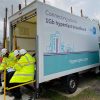TV Could Suffer as UK Mobile Operators Agree Early 4G Launch in H1 2013
The country’s mobile phone operators have finally agreed to put aside their differences after Ofcom moved its timetable for the auction of superfast 4G (LTE) compatible mobile broadband spectrum (800MHz and 2.6GHz) forward by roughly 6 months, which weakened EE’s perceived early-launch advantage. But will Freeview TV services suffer?
Rivals O2 and Vodafone had threatened to tie the auction up in legal challenges after Ofcom in August 2012 granted approval for T-Mobile, Orange UK and EE (Everything Everywhere) to launch the country’s first 4G services over their existing 1800MHz band (here), which would have allowed the service to go live before the end of 2012 (one year ahead of its rivals).
Advertisement
The communications regulator, Ofcom, originally intended for the final spectrum release phase to occur at the end of 2013 (Q4) but this has now been moved forward to “the first half of 2013” (spring). The change, which was brokered yesterday during last minute peace talks with the government, appears to have been enough to allay the concerns.
Ed Richards, Ofcom’s CEO, said:
“The actions we have taken with industry and government avoids the risk of significant delay and is tremendous news for consumers who might otherwise have waited a considerable period for the next generation of mobile broadband services. Ofcom’s objective has always been to release the spectrum as early as possible and we remain focused on starting the auction by the end of the year.”
Maria Miller, Culture Secretary, added:
“Delivering 4G quickly is a key part of our economic growth strategy. I am grateful to the mobile operators for their co-operation in bringing forward vital 4G services.
By speeding up the delivery of 4G in the UK, the Government is creating enormous opportunities. It is up to the operators to now deliver the services that businesses and consumers expect and we are confident they will succeed.”
Under the new plan EE is still expected to proceed with its early 4G launch this month, while Ofcom’s auction process will begin by the end of this year as originally planned. Only the spectrum release appears to have seen a truly significant timetable change. As a result EE will still have an advantage but this benefit has now been slashed.
Indeed it would take time for EE’s new 4G network coverage and performance to mature, while first gen 4G Smartphones, which are known to be somewhat harsh on battery life, won’t perhaps be as attractive as later generations. Similarly most savvy consumers are likely to wait for more competition to emerge before considering a swap.
In order to make this possible Ofcom has needed to fast-track the clearance date for major TV transmitters in Oxford and Waltham by 5 months to May 2013, while the same situation for Glasgow and Edinburgh will be brought forward by more than 3 months to April 2013.
Advertisement
This timetable shift isn’t all good news and indeed one rather significant concern has not been addressed, which relates to the potential impact of the new 4G service on Digital Terrestrial TV (DTTV) services such as Freeview.
The government has already set up a £180m scheme to help 900,000 homes address problems related to LTE (4G) interference in the 800MHz band (even though up to 2 million could actually be affected).
Ed Vaizey MP, Communications Minister, said in July 2012:
“Many of [those living in 4G areas] will also be viewers of digital terrestrial television (OTT) and some of those will unfortunately have those TV services affected by the LTE services unless action is taken to deal with interference. The Government is keen to mitigate the effects of interference, so that no television viewer loses access to television services.”
The problem is that this scheme was designed with the old timetable in mind and could struggle to be ready in time for the new date, which might result in a significant number of homes having to fork out hundreds of pounds in order to solve the situation themselves. But if that happens then the government will at least have the new timetable as a scapegoat.
Separately doubts about the government’s £150m Mobile Infrastructure Project (MIP), which aims to make mobile broadband and voice services available to “at least 98%” of the United Kingdom by the end of 2017 (currently 95%) continue to exist (here). This week’s news might improve that situation and cause Three UK to re-join but many will remain concerned about the increasingly lofty looking commitment.
Advertisement
Mark is a professional technology writer, IT consultant and computer engineer from Dorset (England), he also founded ISPreview in 1999 and enjoys analysing the latest telecoms and broadband developments. Find me on X (Twitter), Mastodon, Facebook, BlueSky, Threads.net and Linkedin.
« ASA UK Ban Virgin Media TV Advert for Misleading Broadband Buffering Claim


















































Comments are closed